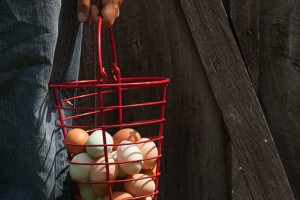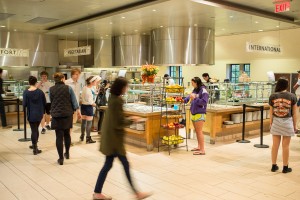
A Slice of Sustainability
Kenyon’s Rural Life Center discusses Knox County’s sustainable agriculture in a student-moderated forum.
Thanks to sociologist Howard Sacks and his students, Kenyon has been recognized as a national leader in the trend of bringing local foods into college dining halls. But Kenyon's farm-to-cafeteria program, Food for Thought, has led students to ideas and relationships that extend far beyond the food stations of Peirce Hall.
Under Sacks' tutelage, Kenyon students fan out as researchers. They also do internships at local organic farms, where their tasks range from medicating goats to discussing federal subsidies and state land-use policies. And it doesn't end with the sociology curriculum. Six Kenyon science students spent their summer on a family farm learning how to convert waste cooking oil into biodiesel fuel. Students and professors have taken up food, and the outward-rippling issues related to food, as a focal point for study and activism.
"With every food choice we make," said Sacks, "we're engaging in a civic act." Food that comes from up the road rather than across the continent is not only likely to be fresher, tastier, and healthier. It hasn't used up as much fossil fuel, or added as much to global warming, in making the trip to the market. Buying food locally means Kenyon supports local farmers and keeps money in the local economy.
Sacks believes that Food for Thought promotes the liberal-arts ideal of educating the whole person because it fosters a sense of place, which he sees as a fundamental human need and source of emotional and intellectual richness. "Sense of place is essential to live a fulfilled life," he said. "It's absolutely integral to the liberal-arts mission."

Kenyon’s Rural Life Center discusses Knox County’s sustainable agriculture in a student-moderated forum.

Grant from The Arthur Vining Davis Foundations sets the stage for interdisciplinary first-year seminar.

A lecture by Professor of Sociology Howard Sacks explores where food comes from, why it matters and what it has to do with a liberal arts education.

“An Amish Sing” brings a local family to Peirce Hall for music and conversation.